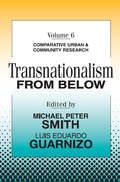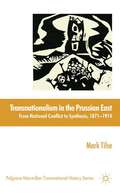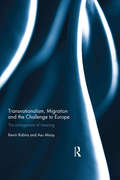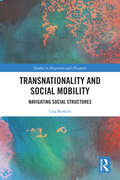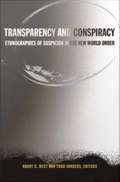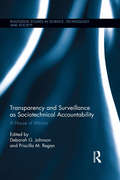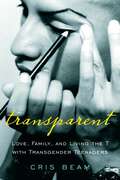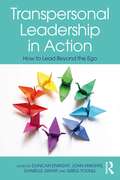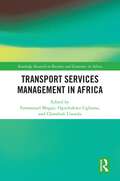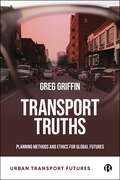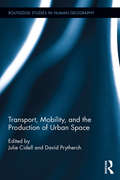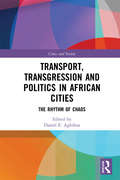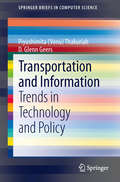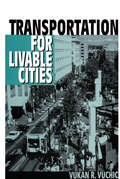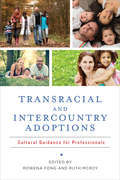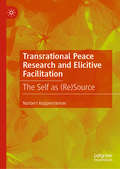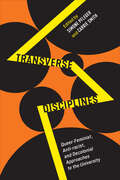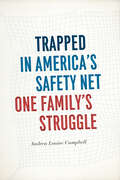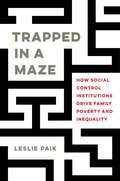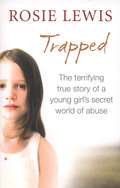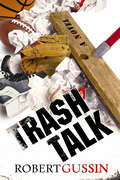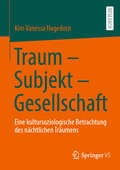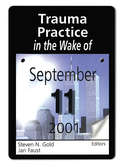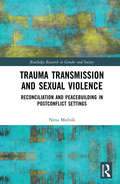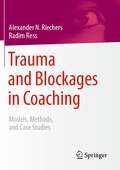- Table View
- List View
Transnationalism from Below: Comparative Urban and Community Research
by Michael Peter SmithExpansion of transnational capital and mass media to even the remotest of places has provoked a spate of discourse on transnationalism. A core theme hi this debate is the penetration of national cultures and political systems by global and local driving forces. The nation-state is seen as weakened by transnational capital, global media, and emergent supranational political institutions. It also faces the decentering local resistances of the informal economy, ethnic nationalism, and grass-roots activism. Transnationalism From Below brings together a rich combination of theoretical and grounded studies of transnational processes and practices, discussing both their positive and negative aspects.The editors examine the scope and limits of transnationalism. The volume is divided into four parts: "Theorizing Transnationalism"; "Transnational Economic and Political Agency"; "Constructing Transnational Localities"; and "Transnational Practices and Cultural Reinscription." Contriburtors include Andre C. Drainville, Josephine Smart, Alan Smart, Minna Nyberg S0rensen, George Fouron, Nina Glick Schiller, Luin Goldring, Sarah J. Mahler, Linda Miller Matthei, Louisa Schein, David A. Smith, and Robert C. Smith. Moving easily between micro and macro analyses, this book expands the boundaries of the current scholarship on transnationalism, locates new forms of transnational agency, and poses provocative questions that challenge prevailing interpretations of globalization. Transnationalism From Below is a pioneering collection that will make a significant addition to the libraries of anthropologists, sociologists, international relations specialists, urban planners, political scientists, and policymakers.
Transnationalism in the Prussian East
by Mark TilseFor more than a century following the Partitions of Poland, a protracted and often bitter national conflict pervaded life in Prussia's eastern border provinces. This book radically interprets the German Polish relationship in the Prussian East according to a theory of 'synthesis' between nations, as the first study to apply this concept in the research of nationalism. Contradiction and conflict between the nations gave rise to mentalities and practices that were 'transnational' and that harmonized the national divide. Transnationalism in the Prussian East examines the nature of this process and its profound social and political consequences, exploring in detail issues of language and semantics, sex and marriage, politics, and culture. "
Transnationalism, Migration and the Challenge to Europe: The Enlargement of Meaning
by Kevin Robins Asu AksoyTransnationalism, Migration and the Challenge to Europe: The Enlargement of Meaning puts forward an alternative outline for thinking about migration in a European context. Moving beyond the agenda of identity politics, the book addresses possibilities more related to the experiential and existential dimensions of migratory – and importantly, post-migratory – lives. Examining the fundamental and radical argument that migrants should be regarded not as a problematical category, but rather as opening up new cultural and imaginative channels for those living in Europe, the book draws on extensive empirical work by the authors undertaken over the past ten years. Grounded in the actual lives and experiences of migrant Turks, the book evaluates how their articulations regarding identity and belonging have been changing over the last decade. The agenda regarding migration and belonging has shifted over this crucial period of time. This shift is counterpoised against the unchanging national positions, and against the supra-national stance of 'official' European approaches and policies regarding migration and identity. Transnationalism, Migration and the Challenge to Europe would be of interest to those involved in sociology, anthropology, transnational studies, migration studies, cultural studies, media studies, European studies.
Transnationality and Social Mobility: Navigating Social Structures (Studies in Migration and Diaspora)
by Lisa BonfertConsidering that changes in people’s life chances are increasingly shaped by cross-border movements and transnational connections, this book proposes a transnational conception of social mobility. Emphasising the manifold ways in which contexts of migration and transnationality affect perceptions and evaluations of betterment, the book argues for linking the study of social and spatial mobility to better capture how people navigate social structures of inequality in a globalised world.Based on the experiences of people who moved to Germany to improve their lives in some way, this book links empirical findings with theoretical considerations from transnational and intersectional scholarship to propose an alternative concept of social mobility that emphasises people’s subjective interpretations of success and failure in their search of betterment.Drawing on the concepts of social spaces, capitals, and reference group theory, a model of the cogwheels of social mobility is proposed to account for the varying ways in which cross-border migration and transnational connections initiate changes in people’s social position within and across country borders.This book will therefore be of interest to scholars of sociology, geography and politics with interests in migration, transnationalism and mobility.
Transparency and Conspiracy: Ethnographies of Suspicion in the New World Order
by Harry G. West Todd SandersTransparency has, in recent years, become a watchword for good governance. Policymakers and analysts alike evaluate political and economic institutions--courts, corporations, nation-states--according to the transparency of their operating procedures. With the dawn of the New World Order and the "mutual veil dropping" of the post-Cold War era, many have asserted that power in our contemporary world is more transparent than ever. Yet from the perspective of the relatively less privileged, the operation of power often appears opaque and unpredictable. Through vivid ethnographic analyses, Transparency and Conspiracy examines a vast range of expressions of the popular suspicion of power--including forms of shamanism, sorcery, conspiracy theory, and urban legends--illuminating them as ways of making sense of the world in the midst of tumultuous and uneven processes of modernization. In this collection leading anthropologists reveal the variations and commonalities in conspiratorial thinking or occult cosmologies around the globe--in Korea, Tanzania, Mozambique, New York City, Indonesia, Mongolia, Nigeria, and Orange County, California. The contributors chronicle how people express profound suspicions of the United Nations, the state, political parties, police, courts, international financial institutions, banks, traders and shopkeepers, media, churches, intellectuals, and the wealthy. Rather than focusing on the veracity of these convictions, Transparency and Conspiracy investigates who believes what and why. It makes a compelling argument against the dismissal of conspiracy theories and occult cosmologies as antimodern, irrational oversimplifications, showing how these beliefs render the world more complex by calling attention to its contradictions and proposing alternative ways of understanding it. Contributors. Misty Bastian, Karen McCarthy Brown, Jean Comaroff, John Comaroff, Susan Harding, Daniel Hellinger, Caroline Humphrey, Laurel Kendall, Todd Sanders, Albert Schrauwers, Kathleen Stewart, Harry G. West
Transparency and Surveillance as Sociotechnical Accountability: A House of Mirrors (Routledge Studies in Science, Technology and Society #28)
by Deborah G. Johnson Priscilla M. ReganSurveillance and transparency are both significant and increasingly pervasive activities in neoliberal societies. Surveillance is taken up as a means to achieving security and efficiency; transparency is seen as a mechanism for ensuring compliance or promoting informed consumerism and informed citizenship. Indeed, transparency is often seen as the antidote to the threats and fears of surveillance. This book adopts a novel approach in examining surveillance practices and transparency practices together as parallel systems of accountability. It presents the house of mirrors as a new framework for understanding surveillance and transparency practices instrumented with information technology. The volume centers around five case studies: Campaign Finance Disclosure, Secure Flight, American Red Cross, Google, and Facebook. A series of themed chapters draw on the material and provide cross-case analysis. The volume ends with a chapter on policy implications.
Transparent: Love, Family, and Living the T with Transgender Teenagers
by Cris BeamWhen Cris Beam first moved to Los Angeles, she thought she might put in just a few hours volunteering at a school for transgender kids while she got settled. Instead she found herself drawn deeply into the pained and powerful group of transgirls she discovered.
Transpersonal Leadership in Action: How to Lead Beyond the Ego
by Duncan EnrightHow can leaders promote diversity, equality and inclusion? What does it mean to let go of leadership? How do learning, feedback and coaching help us become better leaders? Following the success of Leading Beyond the Ego, this book shows how to apply transpersonal leadership – practiced leaders who are radical, ethical, authentic and act beyond their own interests to create high-performing organisations – in a wide range of contexts. It considers the attributes of transpersonal leaders and how they transform organisations by building strong, collaborative relationships and a caring, sustainable and performance-enhancing environment. Shining a light on the way forward for senior leaders and HR and talent professionals, the book covers: Characteristics of transpersonal leaders such as purpose, ethics and adult development Impact of transpersonal leaders on global organisations, during digital transformation and change and through crises Case studies of transpersonal leadership in different contexts including in India and East Asia, when leading remotely, in HR and politics Transpersonal Leadership in Action is essential reading for senior leaders, HR professionals and those responsible for leader and organisational development.
Transport Services Management in Africa (Routledge Research on African Economics)
by Emmanuel Mogaji Chinebuli Uzondu Ogochukwu UgbomaTransportation is an essential part of human activity and a service that makes an enormous contribution to the economic, social, and general well-being of countries and their citizens. However, many developing countries and emerging economies are suffering from institutional challenges that impact their transport infrastructure and ability to provide an effective transport service.This book highlights the research on transportation services in Africa and provides theoretical underpinning for future studies on transport service management. It recognises that one size does not fit all, acknowledging that transport service provision in Africa needs to be contextualised amidst the inherent challenges and the travel demands of citizens. This book moves beyond Western transport, land use, and engineering research to explore transportation from a services and business perspective and provides a comprehensive resource encompassing transport service quality, marketing communication, public sector engagement with stakeholders, and sustainable and inclusive transportation.This edited collection brings together insights from authors across Africa to provide much-needed theoretical and practical knowledge for academic researchers and students, as well as policymakers in the region.
Transport Truths: Planning Methods and Ethics for Global Futures (Urban Transport Futures)
by Greg P. GriffinIdeal for researchers and practitioners looking for fresh approaches to transport problems, this book combines cutting-edge qualitative and quantitative knowledge to inform transport futures. It uses engaging case studies of the Banjul Airport Expansion in The Gambia, and the Interstate 35 development project in Austin, US to show how and why a transdisciplinary approach can result in better planning decisions. As cities grow, shrink, and re-organize, with access provided by transport infrastructure, this book demonstrates the value of critical realism to create lasting, positive impacts on society and the environment.
Transport, Mobility, and the Production of Urban Space (Routledge Studies in Human Geography)
by David Prytherch Julie CidellThe contemporary urban experience is defined by flow and structured by circulating people, objects, and energy. Geographers have long provided key insights into transportation systems. But today, concerns for social justice and sustainability motivate new, critical approaches to mobilities. Reimagining the city prompts an important question: How best to rethink urban geographies of transport and mobility? This original book explores connections – in theory and practice – between transport geographies and "new mobilities" in the production of urban space. It provides a broad introduction to intersecting perspectives of urban geography, transport geography, and mobilities studies on urban "places of flows." Diverse, international, and leading-edge contributions reinterpret everyday intersections as nodes, urban corridors as links, cities and regions as networks, and the discourses and imaginaries that frame the politics and experiences of mobility. The chapters illuminate nearly all aspects of urban transport, from street regulation and roadway planning, intended and "subversive" practices of car and truck drivers, planning and promotion of mass transit investments, and the restructuring of freight and logistics networks. Together these offer a unique and important contribution for social scientists, planners, and others interested in the politics of the city on the move.
Transport, Transgression and Politics in African Cities: The Rhythm of Chaos (Cities and Society)
by Daniel AgbiboaThis collection of field-based case-studies examines the role and contributions of Africa’s informal public transport (also referred to as paratransit) to the production of city forms and urban economies, as well as the voices, experiences, and survival tactics of its poor and stigmatised workforce. With attention to the question of what a micro-level analysis of the organisation and politics of informal public transport in urbanizing Africa might tell us about the precarious existence and agency of its informal workforce, it explores the political and socio-economic conditions of contemporary African cities, spanning from Nairobi and Dar es Salaam to Harare, Cape Town, Kinshasa and Lagos. Mapping, analysing and comparing the everyday experiences of informal transport operators across the continent, this book sheds light on the multiple challenges facing Africa’s informal transport workers today, as they negotiate the contours of city life, expand their horizons of possibility and make the most of their time. It thus offers directions for more effective policy response to urban public transport, which is changing fundamentally and rapidly in light of neoliberal urban planning strategies and ‘World Class’ city ambitions.
Transportation and Information
by D. Glenn Geers Piyushimita Vonu ThakuriahTransformations in wireless connectivity and location-aware technologies hold the promise of bringing a sea-change in the way transportation information is generated and used in the future. Sensors in the transportation system, when integrated with those in other sectors (for example, energy, utility and health) have the potential to foster novel new ways of improving livability and sustainability. The end-result of these developments has been somewhat contradictory. Although automation in the transportation environment has become increasingly widespread, the level of involvement and active participation by people, in terms of co-creation and contribution of information, has also increased. As a result, the following two major trends have been observed: (1) increases in Machine-to- Machine (M2M) communications; and (2) increases in the variety and volume of User-Generated Content. In this transportation paradigm, the pervasive use of Information and Communication Technologies will serve as the foundation for mobility intelligence towards an "ubiquitous information-centered mobility environment". However, many technical and operational questions, as well as social, management and legal challenges present themselves in the transformation to this vision. The book presents a non-technical review of research and initiatives and a discussion of such opportunities and challenges.
Transportation for Livable Cities
by Vukan VuchicThe twenty-first century finds civilization heavily based in cities that have grown into large metropolitan areas. Many of these focal points of human activity face problems of economic inefficiency, environmental deterioration, and an unsatisfactory quality of life—problems that go far in determining whether a city is "livable." A large share of these problems stems from the inefficiencies and other impacts of urban transportation systems.The era of projects aimed at maximizing vehicular travel is being replaced by the broader goal of achieving livable cities: economically efficient, socially sound, and environmentally friendly. This book explores the complex relationship between transportation and the character of cities and metropolitan regions. Vukan Vuchic applies his experience in urban transportation systems and policies to present a systematic review of transportation modes and their characteristics.Transportation for Livable Cities dispels the myths and emotional advocacies for or against freeways, rail transit, bicycles,and other modes of transportation. The author discusses the consequences of excessive automobile dependence and shows that the most livable cities worldwide have intermodal systems that balance highway and public transit modes while providing for pedestrians, bicyclists, and paratransit. Vuchic defines the policies necessary for achieving livable cities: the effective implementation of integrated intermodal transportation systems.
Transracial and Intercountry Adoptions: Cultural Guidance for Professionals
by Rowena Fong Ruth McRoyWith essays by well-known adoption practitioners and researchers who source empirical research and practical knowledge, this volume addresses key developmental, cultural, health, and behavioral issues in the transracial and international adoption process and provides recommendations for avoiding fraud and techniques for navigating domestic and foreign adoption laws. The text details the history, policy, and service requirements relating to white, African American, Asian American, Latino and Mexican American, and Native American children and adoptive families. It addresses specific problems faced by adoptive families with children and youth from China, Russia, Ethiopia, India, Korea, and Guatemala, and offers targeted guidance on ethnic identity formation, trauma, mental health treatment, and the challenges of gay or lesbian adoptions
Transrational Peace Research and Elicitive Facilitation: The Self as (Re)Source
by Norbert KoppensteinerThis book sheds new light on transrational approaches to peace research and highlights elicitive approaches to facilitation. Rather than encouraging researchers, teachers and practitioners to control and suppress their own positionality, the book argues that they can see themselves as a potential (re)source that can be creatively tapped for their work. Using dance as a central metaphor, it seeks to reposition research and facilitation as a truly experiential process where the entirety of human experiences and epistemologies can be brought into interplay, opening up new sources of knowledge. Providing a cutting-edge theoretical framework and based on his practical experience, the author demonstrates that facilitation and research are not just cognitive, but can also be(come) embodied, emotional, intuitive, relational and spiritual. By proposing a systematic, methodological framework for research and facilitation, the book offers practical guidance for peace practitioners, facilitators and researchers interested in working through all dimensions of their being and engaging with conflict transformation in a holistic way.
Transverse Disciplines: Queer-Feminist, Anti-racist, and Decolonial Approaches to the University
by Carrie Smith Simone PflegerFor at least a decade, university foreign language programs have been in decline throughout the English-speaking world. As programs close or are merged into large multi-language departments, disciplines such as German studies find themselves struggling to survive. Transverse Disciplines offers an overview of the current research on the humanities and the academy at large and proposes creative and courageous ideas for the university of the future. Using German studies as a case study, the book examines localized academic work in Australia, Canada, the United Kingdom, and the United States in order to model new ideas for invigorated thinking beyond disciplinary specificity, university communities, and entrenched academic practices. In essays that are theoretical, speculative, experimental, and deeply personal, contributors suggest that German studies might do better to stop trying to protect existing national and disciplinary arrangements. Instead, the discipline should embrace feminist, queer, anti-racist, and decolonial academic practices and commitments, including community-based work, research-creation, and scholar activism. Interrogating the position of researchers, teachers, and administrators inside and outside academia, Transverse Disciplines takes stock of the increasingly tenuous position of the humanities and stakes a claim for the importance of imagining new disciplinary futures within the often restrictive and harmful structures of the academy.
Trapped in America's Safety Net: One Family's Struggle (Chicago Studies in American Politics)
by Andrea Louise CampbellA “remarkable” look at the flaws of the social safety net through one family’s personal tragedy and the Catch-22 financial disaster that followed (Deborah A. Stone, author of Policy Paradox).When Andrea Louise Campbell’s sister-in-law, Marcella Wagner, was run off the freeway by a hit-and-run driver, she was seven-and-a-half months pregnant. She survived—and, miraculously, the baby was born healthy. But that’s where the good news ends. Marcella was left paralyzed from the chest down. This accident was much more than just a physical and emotional tragedy. Like so many Americans, neither Marcella nor her husband, Dave, who worked for a small business, had health insurance. On the day of the accident, she was on her way to class for the nursing program through which she hoped to secure one of the few remaining jobs in the area with the promise of employer-provided insurance. Instead, the accident plunged the young family into the tangled web of means-tested social assistance.As a social policy scholar, Campbell thought she knew a lot about means-tested assistance programs. What she quickly learned was that missing from most government manuals and scholarly analyses was an understanding of how these programs actually affect the lives of the people who depend on them. Using Marcella and Dave’s situation as a case in point, she reveals the programs’ shortcomings in this book. Because American safety net programs are designed for the poor, the couple first had to spend down their assets and drop their income to near-poverty level before qualifying for help. What’s more, to remain eligible, they’ll have to stay under these strictures for the rest of their lives, barred from doing many of the things middle-class families are encouraged to do: Save for retirement. Build an emergency fund. Take advantage of tax-free college savings. And, while Marcella and Dave’s story is tragic, the financial precariousness they endured even before the accident is all too common in America, where the prevalence of low-income work and unequal access to education have generated vast—and growing—economic inequality. The implementation of the ACA has cut the number of uninsured and underinsured and reduced some disparities in coverage, but continues to leave too many people open to tremendous risk.Behind the statistics and beyond the ideological battles are human beings whose lives are stunted by policies that purport to help them. In showing how and why this happens, Trapped in America’s Safety Net offers a way to change it.“An engaging narrative account of how social assistance programs shape real people’s lives. Campbell is authoritative and scholarly, yet warm and personal—a rare combination one sees in the likes of Oliver Sacks and Barbara Ehrenreich.” —Deborah A. Stone, author of Policy Paradox“Makes a compelling case for a stronger, more integrated, and ultimately more effective strategy for helping the millions of Americans who find themselves plummeting out of the insecure middle class.” —Jacob S. Hacker, New York Times–bestselling coauthor of Winner-Take-All Politics
Trapped in a Maze: How Social Control Institutions Drive Family Poverty and Inequality
by Leslie PaikTrapped in a Maze provides a window into families' lived experiences in poverty by looking at their complex interactions with institutions such as welfare, hospitals, courts, housing, and schools. Families are more intertwined with institutions than ever as they struggle to maintain their eligibility for services and face the possibility that involvement with one institution could trigger other types of institutional oversight. Many poor families find themselves trapped in a multi-institutional maze, stuck in between several systems with no clear path to resolution. Tracing the complex and often unpredictable journeys of families in this maze, this book reveals how the formal rationality by which these institutions ostensibly operate undercuts what they can actually achieve. And worse, it demonstrates how involvement with multiple institutions can perpetuate the conditions of poverty that these families are fighting to escape.
Trapped: The Terrifying True Story of a Young Girl's Secret World of Abuse
by Rosie LewisLocked for nine years in a secret world of severe abuse, as Phoebe opens up about her horrific past, her foster carer begins to suspect that Phoebe may not be suffering from autism at all.
Trash Talk: An Encyclopedia Of Garbage And Recycling Around The World
by Robert GussinFootball, baseball, basketball, hockey - pro athletes revolt! Too many fights, too many problems, lousy image! The commissioners are fed up and players are angry at mandated, educational seminar attendance! But that's what happened, and the commissioners aren't backing down. All pro athletes have to attend a course or seminar unrelated to sports every year. It looks like dark days for the athletes until one of them sees an ad for the upcoming S.E.S. Trash Talk symposium. How perfect is that? None of the athletes knew, or even cared, what S.E.S. was, but trash talk was their specialty. Word of the meeting spread among the athletes like wildfire. They could not apply fast enough. The annual Environmentalist Society Meeting, hosted by the Sarasota Environmentalist Society (S.E.S.), will be a surprise of a lifetime when the world of professional athletes collides with the world of professional environmentalists in an explosion of laughter. What happens next is worth the price of admission!
Traum – Subjekt – Gesellschaft: Eine kultursoziologische Betrachtung des nächtlichen Träumens
by Kim Vanessa HagedornDieses Buch fragt nach sozialen und kollektiven Aspekten des nächtlichen Träumens sowie nach dessen Subjektivierungspotenzialen. Die Annäherung erfolgt erstens über das Verhältnis von Traum und Subjekt, zweitens über die Praktiken im Umgang mit Träumen, drittens über das wechselseitige Verhältnis von Traum und Gesellschaft und viertens über das sich Entziehende des Traums. Der wissenschaftshistorische Rahmen erstreckt sich über vier Zeitschnitte entlang von Bezügen zu und Beispielen aus Literatur, Philosophie, Kunst, Spiritismus, Psychologie und Neurowissenschaften vom 18. Jahrhundert bis in die Gegenwart.
Trauma Practice in the Wake of September 11, 2001
by Steven N Gold Jan FaustTrauma practitioners and educators: are you ready to meet the challenges of the aftermath of terrorist attacks?Trauma Practice in the Wake of September 11, 2001 will show you how frontline trauma practitioners responded to the crisis of the terrorist attacks. In keeping with Haworth’s mission to provide practitioners and educators with timely information on the assessment and treatment of trauma, this essential book responds to the traumatic impact of the events of September 11th, 2001 and their implications for trauma practice. In Trauma Practice in the Wake of September 11, 2001, you’ll hear from the leaders of the Green Cross--one of the most prominent organizations providing psychological disaster response services--on their experience in the World Trade Center disaster, and read about the treatment of a client who was in the first WTC bombing in 1993. You'll also find revealing interviews with an Israeli psychologist and a Palestinian psychiatrist who focus on the impact of terrorism on their citizens. Trauma Practice in the Wake of September 11, 2001 is your key to state-of-the-art information on: the psychology of terrorism the traumatic impact of terrorism on those directly affected the traumatic impact of terrorism on the general population ways to help children, adolescents, and adults cope with the aftermath of the terrorist attacks on America how to deal with “compassion fatigue” (emotional depletion among helping professionals working with traumatized populations) traumatologists’response to rescue workers and victims in New York CityThe catastrophic events of September 11th have and will continue to raise special challenges for those of us in the field of trauma practice. By publishing this book and the ones to follow, we hope to assist trauma practitioners and educators in effectively meeting these continuing challenges.
Trauma Transmission and Sexual Violence: Reconciliation and Peacebuilding in Post Conflict Settings (Routledge Research in Gender and Society)
by Nena MočnikThis book grapples with the potential impacts of collective trauma in war-rape survivors’ families. Drawing on inter-ethnic and inter-generational participatory action research on reconciliation processes in post-conflict Bosnia-Herzegovina, the author examines the risk that female survivors of war-related sexual crimes, now-mothers, will breed hatred and further division in the post-conflict context. Showing how the historical trauma of sexual abuse among survivors affects the ideas, perceptions, behavioural patterns and understandings of the ethnic and religious ‘Other’ or perpetrator, the book also considers the influence of such trauma on other attitudes rarely addressed in peacebuilding programmes, such as notions of naturalised gender-based violence, cultural scripts of sexuality and support for dangerous or violent aspects of the patriarchal social order. It thus seeks to sketch proposals for a curriculum of peacebuilding that takes account of the legacy of war rape in survivors’ families and the impact of trauma transmission. As such, Trauma Transmission and Sexual Violence will appeal to scholars of politics, sociology and gender studies with interests in peace and reconciliation processes and war-related sexual violence.
Trauma and Blockages in Coaching: Models, Methods, and Case Studies
by Radim Ress Alexander N. RiechersBlockages to be solved with coaching are often the result of repressed traumatic experiences of a person or their ancestors. Pictorial models will guide the reader into the multi-layered landscape of the soul and its principles. Along the way, the book decodes traumas as the soul’s fundamental building blocks and follows them back to their origins: existential limit-experiences and their common denominator, the splitting of the soul. The consequences of this autonomous survival mechanism affect all areas of life, starting from the unconscious. Therefore, they are not accessible by conventional methods working with the conscious mind. The presented integrative approach provides means and ways that significantly expand the potential of coaching.
